

Politics
Israel’s Knesset Names Trump as Middle East Peacemaker – But Here’s Why It’s Complicated!
Published
2 weeks agoon
By
OBS
World leaders, diplomatic insiders, and much of the media are celebrating a ceasefire in Gaza calling it a “peace deal” and endorsing President Donald Trump’s now unsuccessful campaign for a Nobel Peace Prize.
After the release of all the living Israeli hostages by Hamas, Benjamin Netanyahu and the Knesset cheered the arrival of the US president in Israel, heaping platitude after platitude on him, claiming that his election meant that “overnight, everything changed”.
US secretary of state Marco Rubio insisted the turning point came when Trump convened meetings with Arab and Muslim leaders on the sidelines of the UN General Assembly in September.
“The president had some extraordinary phone calls and meetings that required a high degree of intensity and commitment and made this happen,” Rubio said.
As the deal emerged, Trump let it be known that it was his conversations with Netanyahu when he told him, “you can’t fight the world, Bibi”, that also played a part.
Yet even Trump himself seemed to acknowledge that it wasn’t all just down to the art of the deal when he said: “So many different things happened that were so amazing. It’s a lot of talent involved, I’ll tell you. But there was a certain degree of luck, too. You know, you need luck also. There is such a thing as luck.”
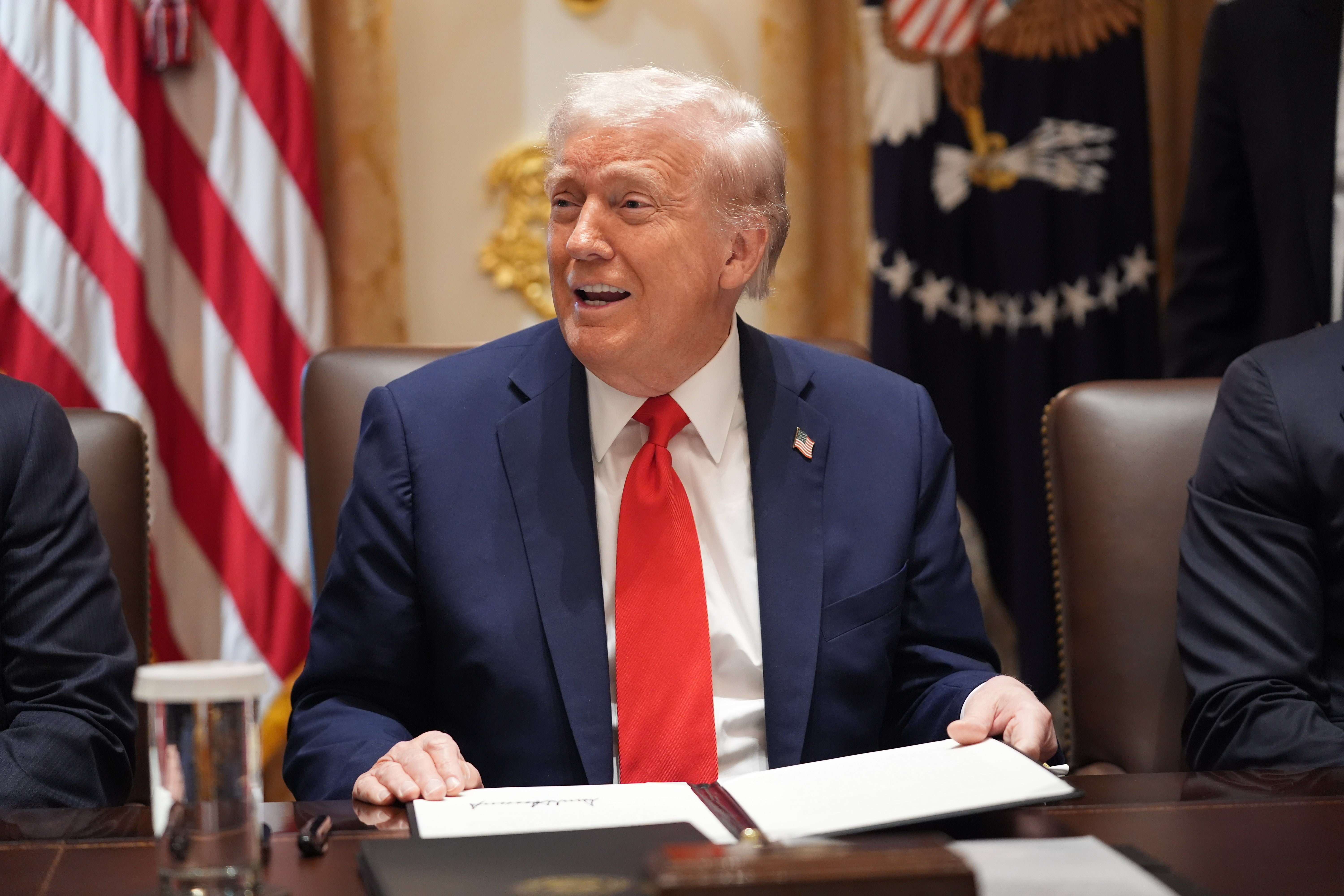
The Knesset lifted up the prospect of the Nobel peace prize again. The most detailed argument for The Donald to get the Norwegian gong came from an Israeli hostage negotiator who said it was only the current US president who could have delivered on a deal that was on the desk of his predecessor a year ago.
On the face of it, Gershon Baskin’s revelations, which he published on social media, show that Trump succeeded where Joe Biden failed.
“This deal could have been done a long time ago,” he wrote. “Hamas agreed to all of the same terms in September 2024. But at that point the response of the Israeli negotiators was that ‘the prime minister did not agree to end the war’.”
That Netanyahu refused the deal a year ago and that Biden failed to make him take it is not new. But it does reinforce the idea that Biden was weak – and that only Trump could have held “Bibi’s” feet to the fire to get him to agree to end the slaughter in Gaza, and to get the remaining hostages, dead and alive, back home.
“I met with members of the American negotiating team in October 2024, and they were as frustrated as I was in their inability to convince Biden and Biden’s people to look seriously at the deal on the table,” said Baskin, who was running back-channel negotiations for the release of hostages with Hamas at the time.
The Independent’s sources have confirmed that Biden’s own staff were deeply frustrated at his refusal to put pressure on Netanyahu to limit his military campaign in Gaza to a few weeks after the October 7 atrocities.
Biden, they said, would not take their advice and sided with Netanyahu.
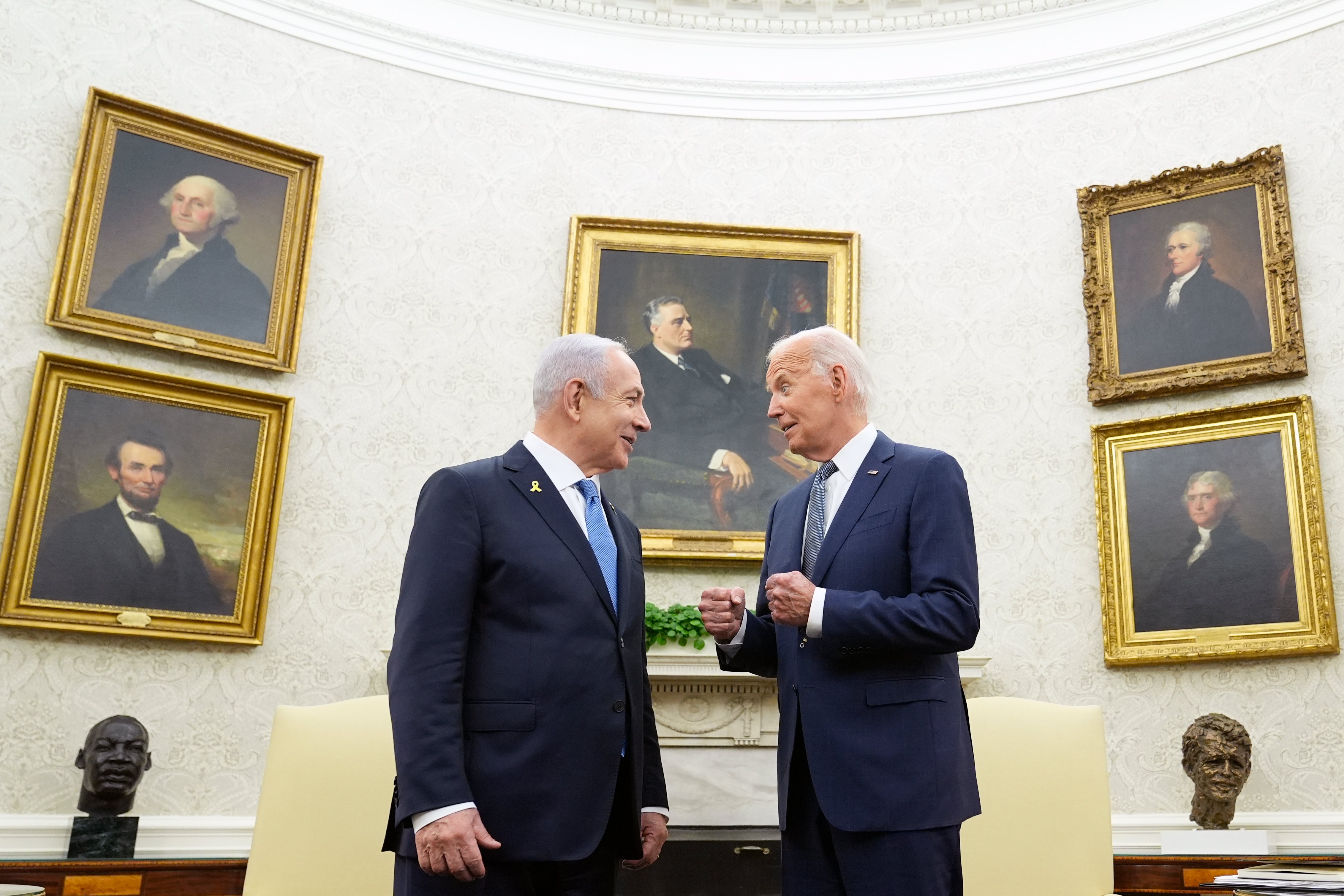
A year later, with much (but not all) of Gaza in ruins, Baskin’s proposals, thrashed out with the help of Qatar, were getting nowhere in the White House.
“Hamas was ready for a deal to release all of the hostages, not to govern Gaza any longer and to end the war. But Israel was not ready,” says Baskin.
Exactly.
A year ago, Netanyahu had not seen his military achieve what he wanted from them. The far-right elements of his government want Gaza depopulated so that they can absorb the strip into the Israeli state.
For him, Gaza was not yet flattened enough to meet his tactical aim – which was, and is, the annihilation of any militant’s ability to attack Israel again for the next couple of decades.
This is not a quest for peace – it is the absence of threat.
Baskin went on to argue that it was clear only the Trump administration could deliver Israeli support for a ceasefire that Hamas had agreed to.
“On December 26, 2024, it was clear to me that the only way that the war would come to an end is when President Trump makes the decision that it has to end… The Israeli side would accept whatever Trump forced them to accept.”
That last sentence is the argument that underpins the Trump for Nobel argument. It can be true and nonsense at the same time.
Hamas is an extremist organisation that fetishises martyrdom for itself and the population it rules in Gaza. But by October last year it had clearly had enough. It wanted to survive as a movement and had achieved its aim of provoking a clash of civilisations with Israel and forcing the Palestinian issue back onto the world agenda.
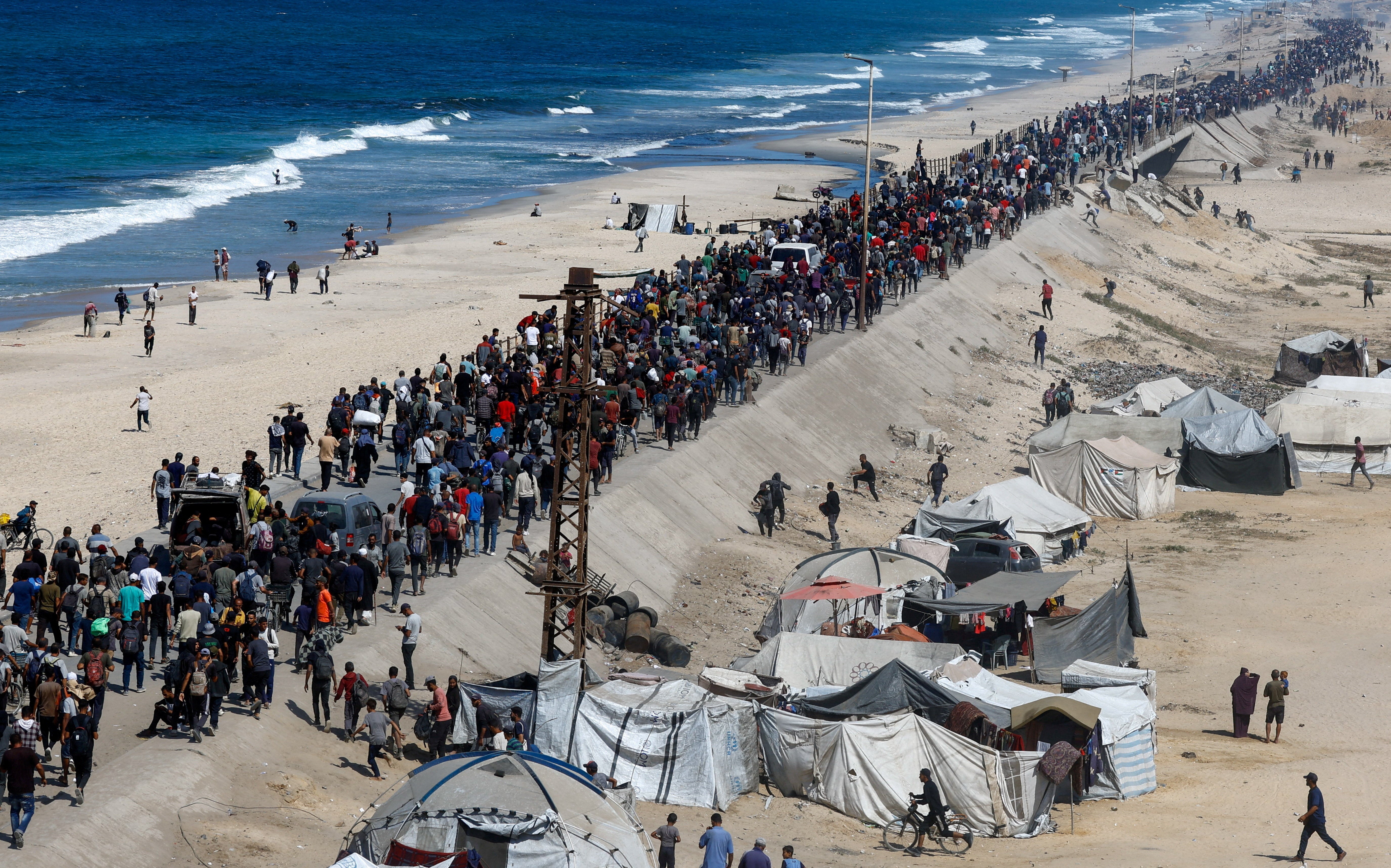
In September this year, with Trump eight months into office, Baskin says he was getting Hamas close to accepting a ceasefire deal and longer-term peace, but was thwarted when Israel bombed Doha, targeting the chief Hamas negotiator Khalil al-Hayya.
That bombing shows that Israel had contempt for Trump. It showed that the US was being played while Israel continued to smash Gaza and the Hamas leadership.
“For over a year I believed that if President Trump decides that the war has to end, Trump will force Netanyahu into the agreement. That is exactly what happened”.
Really?
A more straightforward view would be that Netanyahu achieved what he set out to do – which is to make the Gaza Strip, home to 2.2 million people, unliveable. At least 80 per cent of its buildings, including all of its hospitals, have been destroyed in what the United Nations has said is a genocide.
Israel’s prime minister even endorsed Trump’s loopy scheme to move Gazans out of Gaza and turn it into a holiday resort.
When the shooting and the bombing stop, Gazans will leave the smoking rubble of their homeland in huge numbers and for ever. That, for Netanyahu, will be a victory in itself and one that he could not guarantee a year ago, but he sure can now.
On top of that, he has headed off a growing global chorus calling for boycotts, disinvestment and sanctions (BDS) against Israel.
Sure, for now, Gazans can stay in Gaza. There will be plans to rebuild it. Gulf autocracies will stump up billions for the effort while Israel blocks most reconstruction efforts in the name of its own security (not unreasonably, as Hamas used building funds to make its network of “terror tunnels”).
Talks about a future Palestinian state will be protracted, and continue while Israel continues to annex chunks of the West Bank, while the tired and broken masses of Gaza emigrate to anywhere they can live behind four walls, not tent canvas.
“President Trump deserves the Nobel Peace Prize… we can breathe again,” says Baskin.
Trump has delivered the conditions for what Netanyahu will consider a victory, but the hardest part comes next in determining peace for either Israelis or their nearest neighbours.
You may like
-


Latest Ukraine-Russia War Update: Trump Official Says Putin Will Pay the Price if Fighting Continues!
-


Trump Claims Infantino Would Instantly Shift World Cup Matches at His Request – Find Out Why!
-


Trump Approves Secret CIA Missions in Venezuela as Military Considers Land Strikes!
-


PDP Names Obi as Secretary for 2025 Convention – Find Out What This Means!
-
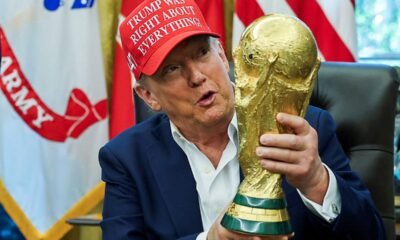

Shocking Threat: Why Trump Might Pull World Cup Matches from Boston!
-


Trump’s Middle East Peace Dream Crumbles Just 24 Hours In!
Politics
Scary Moment: Pete Hegseth’s Plane Make Emergency Landing in the UK!
Published
2 weeks agoon
October 16, 2025By
OBS
An airplane carrying Secretary of War Pete Hegseth was forced to make an emergency landing in the UK Wednesday due to a crack in its windshield, officials said.
Pentagon spokesperson Sean Parnell wrote on social media that on the way back to the U.S. after NATO’s Defense Minister meeting in Belgium, the plane made an “unscheduled landing in the United Kingdom” because of a crack in the aircraft’s windshield.
The plane landed based on standard procedures, and all of the passengers on board, including Hegseth, were safe, Parnell added.
“All good. Thank God,” Hegseth wrote on X. “Continue mission!”
Hegseth was traveling in a C-32A, a modified Boeing 757 used by the Air Force for VIP transport. Other top leaders, including Secretary of State Marco Rubio, Vice President JD Vance and occasionally, even President Donald Trump, use the aircraft when visiting airports with runways too short for the modified Boeing-747 Trump typically uses as Air Force One.
It was unclear what caused the crack in the plane’s windshield.
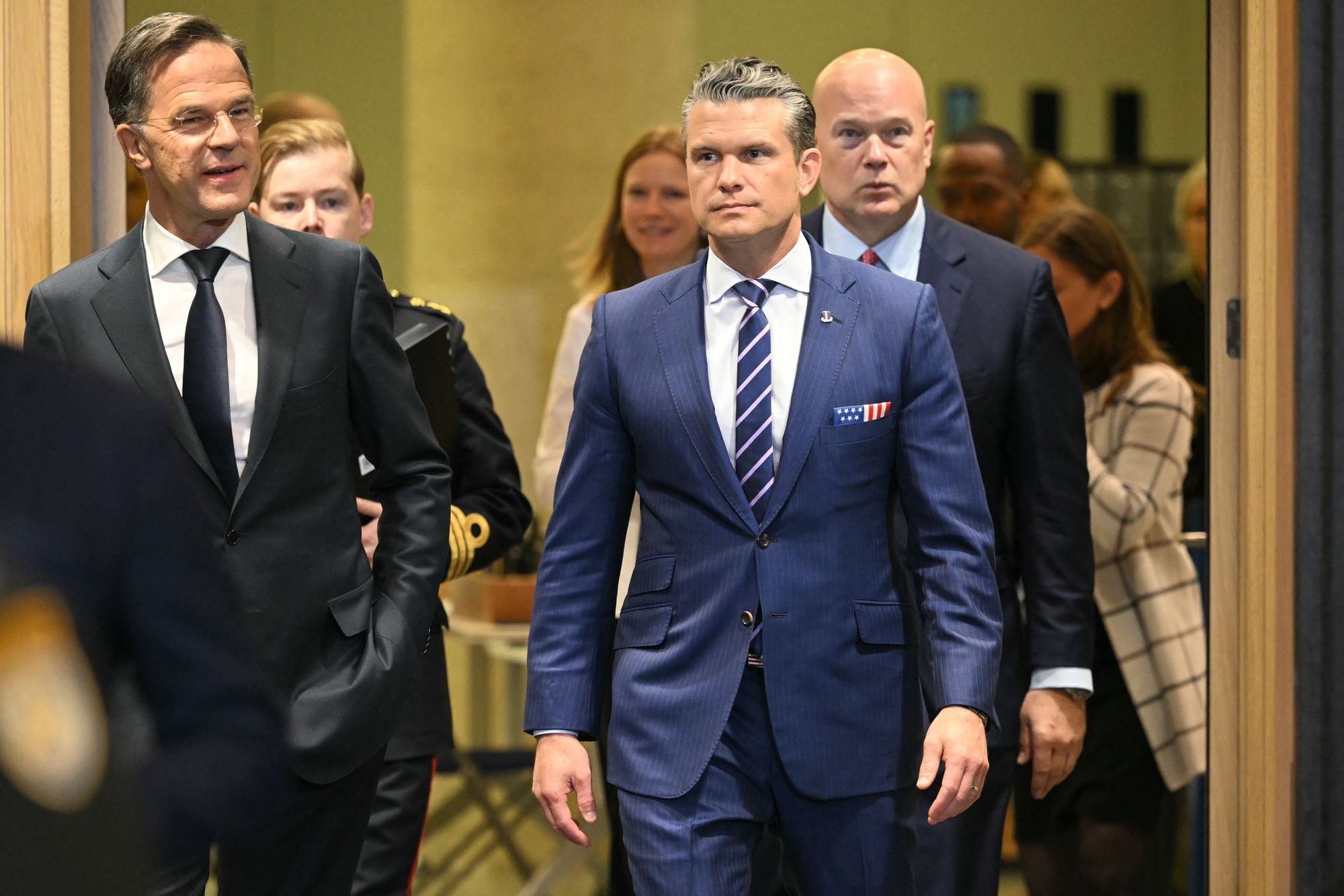
Flight tracking data showed that the plane took off from Brussels and made it past Ireland before turning around to land at Royal Air Force Mildenhall in England at 7:07 p.m. local time. It was not known what time the plane initially took off.
Hegseth and previous Secretaries of Defence have traditionally used a different aircraft for foreign travel, the Boeing E-4B.
The Boeing E-4B is a modified Boeing-747 that has been hardened for use as an airborne command post by the president or Pentagon leadership during nuclear conflicts. It is known within the Air Force as “Air Force One when it counts” and the “Doomsday plane.”
It was not immediately clear why Hegseth was traveling on the smaller, C-32 plane.
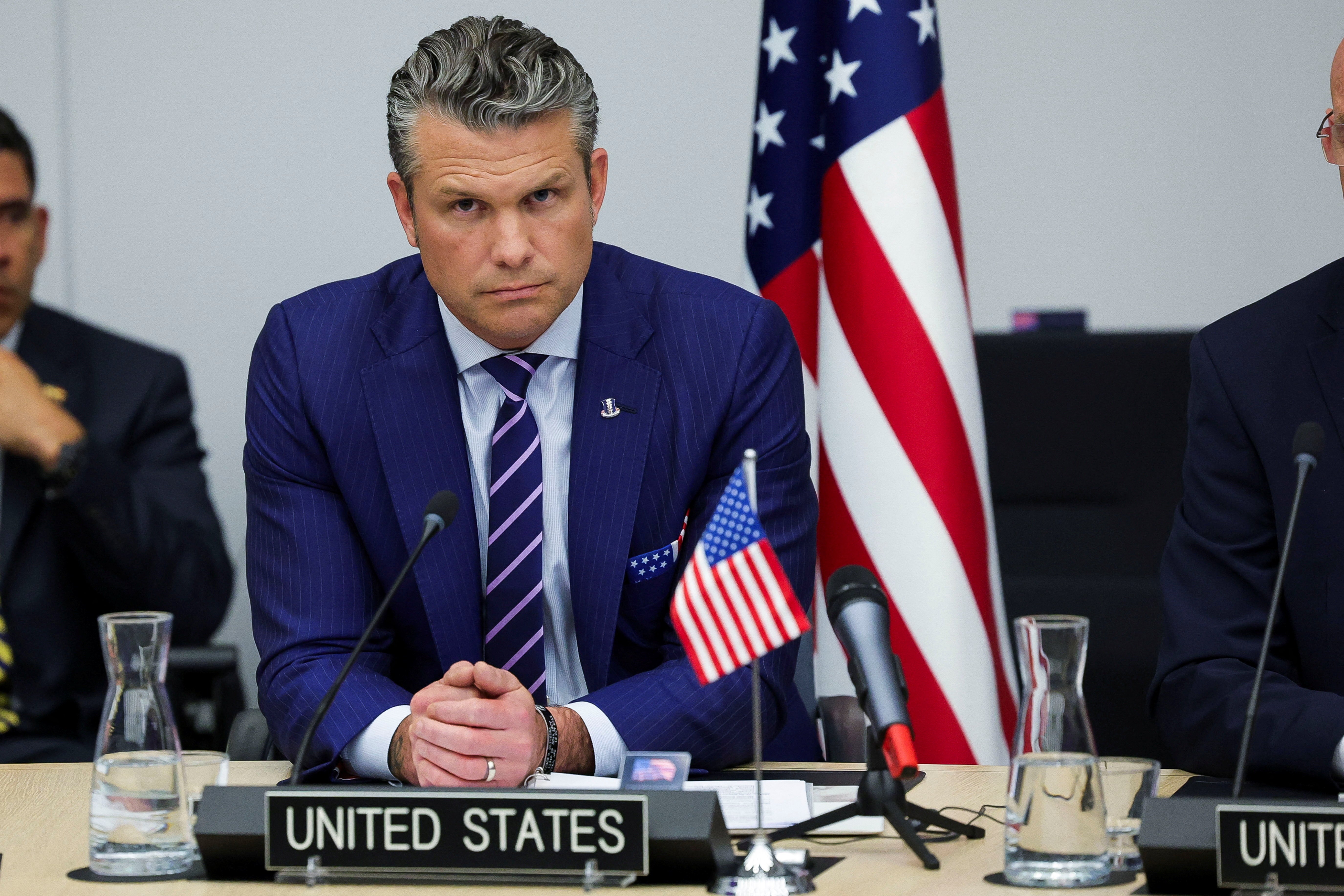
The C-32, which had to perform an emergency landing, has less capabilities than the E-4B, but is decked out with a more luxurious interior thanks to upgrades made during Trump’s first term as president.
During his time in Brussels, Hegseth warned the U.S. would “impose costs on Russia for its continued aggression” if the war in Ukraine does not come to an end.
“If we must take this step, the U.S. War Department stands ready to do our part in ways that only the United States can do,” Hegseth said at a meeting of the Ukraine Defence Contact Group of Kyiv’s allies at NATO headquarters.
Hegseth did not elaborate. His comments came as Trump’s administration is considering a request by Ukraine for long-range Tomahawk missiles.
Earlier this year, an Air Force plane carrying Rubio to Munich was forced to return to Washington after experiencing a mechanical problem.
Politics
Is China Beating the US in the Trade War? Find Out Now!
Published
2 weeks agoon
October 16, 2025By
OBS
The trade war between China and the US intensified this week with both nations imposing new port fees on each other’s ships.
The latest escalation in tensions between the world’s two largest economies sent bilateral relations, and the markets, into a tailspin.
After Beijing announced stricter restrictions on rare earth exports – in retaliation for the US dramatically expanding sanctions on Chinese firms – president Donald Trump threatened 100 per cent tariffs and new curbs on “all critical software”.
Trade analysts suspect that Mr Trump’s threatened three-digit tariff will heighten market uncertainty in the near term, especially in sectors with strong supply chain exposure to China like manufacturing and technology.
Rare earths, vital for use in electric vehicles, aircraft engines, military radars and a range of everyday electronics, are a key sticking point in negotiations between the sparring nations.
China produces almost 70 per cent and processes nearly 90 per cent of the world’s rare earth elements.
The Chinese announcement was an apparent surprise to Mr Trump, who called it an “out of the blue” move. But, over the weekend, he sounded more conciliatory than in the past, although he still refused to withdraw the tariff threat.
In a post on Truth Social, Mr Trump said: “The U.S.A. wants to help China, not hurt it!!!”
China seems unfazed by Mr Trump’s threats and its export boom suggests Beijing may be gaining the upper hand in the trade war.
“China’s position is consistent. If there’s a fight, we will fight to the end; if there’s a talk, the door is open,” a Chinese commerce ministry spokesperson said on Tuesday.
“The US cannot demand talks while simultaneously imposing new restrictive measures with threats and intimidation. This is not the right way to engage with China.”
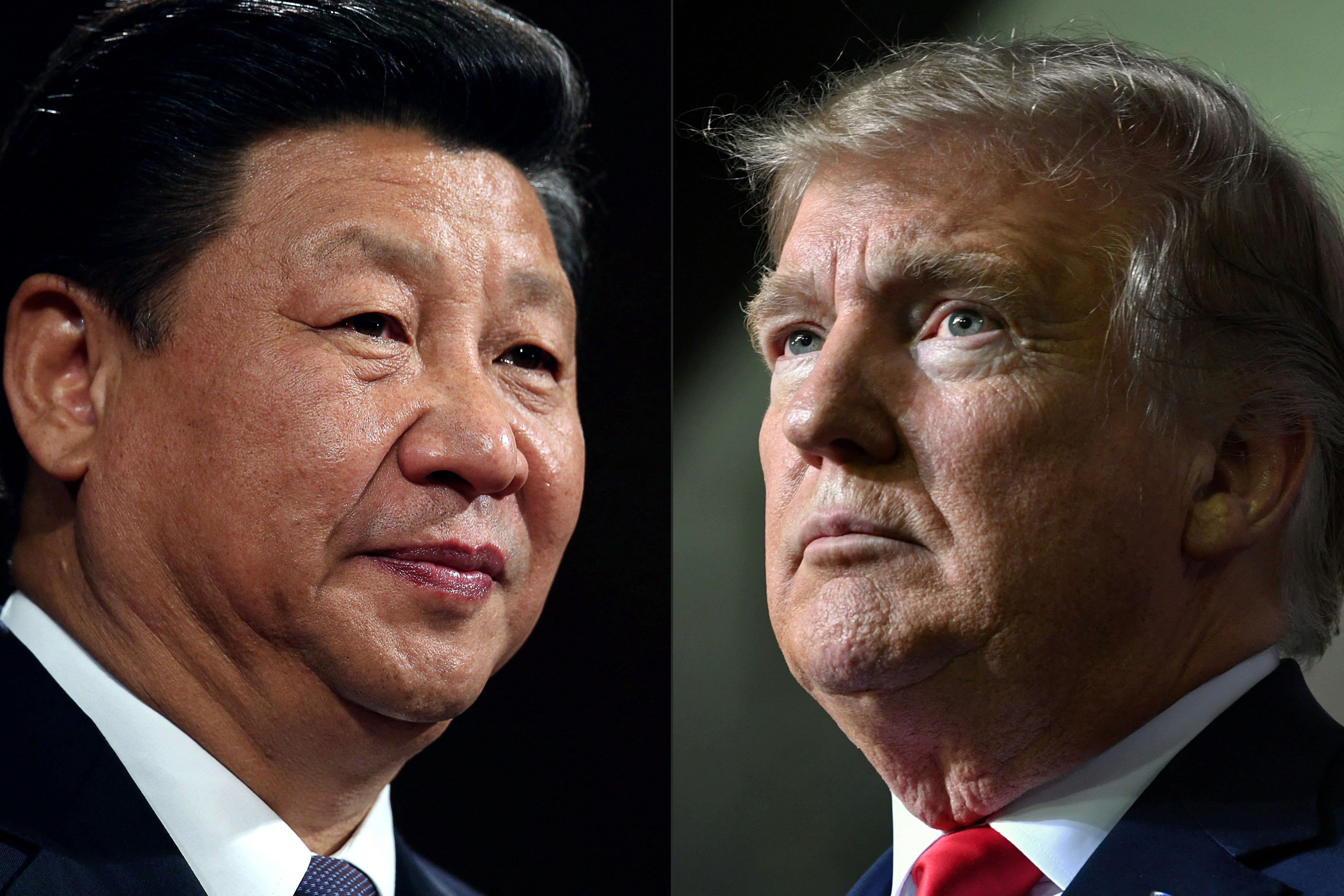
Is China winning the trade war?
China appears to be gaining the upper hand in the ongoing trade dispute with the US, nearly six months after Mr Trump imposed steep import levies on the Asian economic giant.
Chinese exports rose 8.3 per cent in September from a year earlier to about £246bn even as shipments to the US fell about 27 per cent.
After Mr Trump declared his worldwide tariffs in April, several major countries moved to diversify their foreign trade, signalling a global shift towards a system where the US was no longer the central market.
In line with this shift, Chinese shipments to non-US destinations grew 14.8 per cent, the fastest since March 2023, according to data from the General Administration of Customs. The exports to the EU grew 14 per cent, to Asean countries by 16 per cent and to Africa about 56 per cent.
The minimal impact of the Trump tariffs on its overall trade only strengthened China’s resolve to adopt a firmer position in negotiations with Washington, as reflected in the stricter restrictions on exports.
Strong demand from markets beyond the US indicates that Chinese exporters may be less vulnerable to the additional tariffs threatened by Mr Trump. Chinese imports were up 7.4 per cent last month, pointing to a potential recovery in domestic consumption.
A self-driven recovery in China would mark a clear erosion of US dominance in the global economy. But analysts caution it is too soon to declare a winner in the trade dispute.
“While China’s recent export growth suggests some resilience, it doesn’t necessarily indicate that Beijing has gained an advantage in the trade war,” Lukman Otunuga, a senior market analyst at broker FXTM, told The Independent.
“Much of that uptick could reflect front-loading of shipments ahead of new tariffs or shifts in trade routes. The overall picture remains mixed, with both economies experiencing structural challenges amid the prolonged trade tensions.”

Mr Otunuga said the additional US levies were likely to heighten market uncertainty in the near term, and “investors may see higher volatility as markets weigh the impact on corporate earnings and global growth prospects”.
What are the new levies?
Mr Trump last week unveiled an additional levy of 100 per cent on Chinese imports to the US, along with new export controls on critical software, from 1 November. He also threatened to cancel a planned in-person meeting with President Xi Jinping, their first in six years, but US treasury secretary Scott Bessent later told Reuters the two leaders were on track to meet in South Korea in late October.
Bloomberg Economics estimates that a 100 per cent tariff hike by the US will raise effective rates on Chinese goods to 140 per cent, which could halt trade altogether.
“So far this year, China has shown that while it does not wish for a trade war, it is willing to retaliate to escalations as needed,” Lynn Song, chief Greater China economist at ING Bank NV, told Bloomberg.
“The export resilience will likely strengthen confidence in this approach ahead of the talks later this month.”
According to the Peterson Institute for International Economics, average US tariffs on Chinese imports reached 58 per cent by end of September, while Chinese tariffs were at 33 per cent.
Despite current rates already sitting 25 percentage points above the global average, China’s manufacturing strength continues to drive export growth.
In a tit-for-tat move, China hit US-owned vessels docking in the country with new port fees, which came into effect on Tuesday.
Vessels owned or operated by American companies or individuals would be subjected to a 400 yuan (£42) per net tonne fee per voyage if they were to dock in China, Beijing announced last week. The fees would be applied on the same ship for a maximum of five voyages each year, and would rise every year until 2028, when it would jump to 1,120 yuan (£117) per net tonne.
The duties are largely aligned with the port fees introduced by the US. Vessels owned or operated by Chinese entities will be charged $50 (£37) per net tonne for each voyage to the US, which will rise by $30 (£22) per net tonne each year until 2028.
China’s new port fees could affect oil tankers accounting for 15 per cent of global capacity, according to Clarksons Research.
Will Donald Trump meet Xi Jinping to negotiate trade?
Mr Trump and Mr Xi were expected to meet at the Apec summit in South Korea at the end of October. There was also talk of the US president visiting Beijing in January, but those meetings appeared less probable after the recent escalation in tensions.
Mr Bessent said the US president remained on track to meet the Chinese leader as he sought to reassure traders and investors on both sides of the Pacific, highlighting the cooperation between their negotiating teams and the possibility they could yet find a way forward from the current tariff truce.
“We have substantially de-escalated,” Mr Bessent told Fox Business Network on Monday.
Substantial communications between the two sides had taken place over the weekend and there would be US-China staff-level meetings this week in Washington on the sidelines of the World Bank and International Monetary Fund annual gatherings, he added.
“The 100 per cent tariff does not have to happen,” Mr Bessent said. “The relationship, despite this announcement last week, is good. Lines of communication have reopened, so we’ll see where it goes.”
“President Trump said the tariffs would not go into effect until November 1,” he added. “He will be meeting with Party Chair Xi in Korea. I believe that meeting will still be on.”
Washington and Beijing have been negotiating since May.
China’s commerce ministry confirmed on Tuesday that a working-level meeting had taken place the previous day.
It also highlighted formal negotiations held earlier in London, Stockholm and Madrid, culminating in a 90-day tariff extension.
The ministry, however, warned that “the US cannot ask for talks while simultaneously threatening new restrictive measures”.
Politics
Latest Ukraine-Russia War Update: Trump Official Says Putin Will Pay the Price if Fighting Continues!
Published
2 weeks agoon
October 16, 2025By
OBS
US pressures Japan to halt Russian oil imports
US treasury secretary Scott Bessent said he has urged Japan to halt all imports of Russian energy, signalling a harder line from the Trump administration toward allies maintaining limited trade ties with Moscow.
“Minister Kato and I also discussed important issues pertaining to the US–Japan economic relationship and the Administration’s expectation that Japan stop importing Russian energy,” Bessent posted on X after his meeting with Japan’s finance minister Katsunobu Kato in Washington.
The two met on the sidelines of the IMF annual meetings and the G7 and G20 finance leaders’ gatherings being held this week in Washington.”
Japan will do what it can based on the basic principle of coordinating with G7 countries to achieve peace in Ukraine in a fair manner,” Kato told reporters, when asked whether Japan was urged by Bessent to stop importing Russian energy.
Tokyo has already pledged to phase out Russian oil imports as part of the G7’s coordinated sanctions response to Russia’s 2022 invasion of Ukraine.
However, Japan continues to buy Sakhalin Blend crude – a byproduct of liquefied natural gas (LNG) production from the Sakhalin-2 project in Russia’s Far East.
The energy source remains crucial for Japan, providing about 9 per cent of its total LNG imports, a key component of its energy security.
Shweta Sharma16 October 2025 04:01
IMF chief plans to visit Ukraine, Bloomberg reports
The International Monetary Fund’s managing director, Kristalina Georgieva, plans to travel to Ukraine, supporting its efforts to secure a new loan package in the fourth year of the war, Bloomberg has reported.
An IMF spokesperson said: “Our staff remains actively engaged with the Ukrainian authorities on macroeconomic policies aimed at maintaining stability, financing essential expenditures, and restoring debt sustainability, with a view to continued IMF support.”
The exact time of the visit is yet to be determined.
Harriette Boucher16 October 2025 04:00
India to stop buying Russian oil, Trump claims
Trump said on Wednesday that Indian Prime Minister Narendra Modi has pledged to stop buying oil from Russia, India’s top oil supplier, but could not halt its shipments “immediately”.
The announcement comes as Trump tries to step up efforts to cut off Moscow’s energy funding.
“Now I’ve got to get China to do the same thing,” Trump told reporters.
The Indian embassy in Washington has not yet confirmed this.
Harriette Boucher16 October 2025 03:00
Zelensky and Greek PM discuss possibility of U.S.-supplied natural gas
Zelensky and Greek Prime Minister Kyriakos Mitsotakis discussed the possibility of the U.S. supplying natural gas to Ukraine as it struggles with the consequences of Russia’s multiple attacks on the country’s energy system.
Ukraine’s president said he was working to strengthen its air defence as much as possible before winter begins.
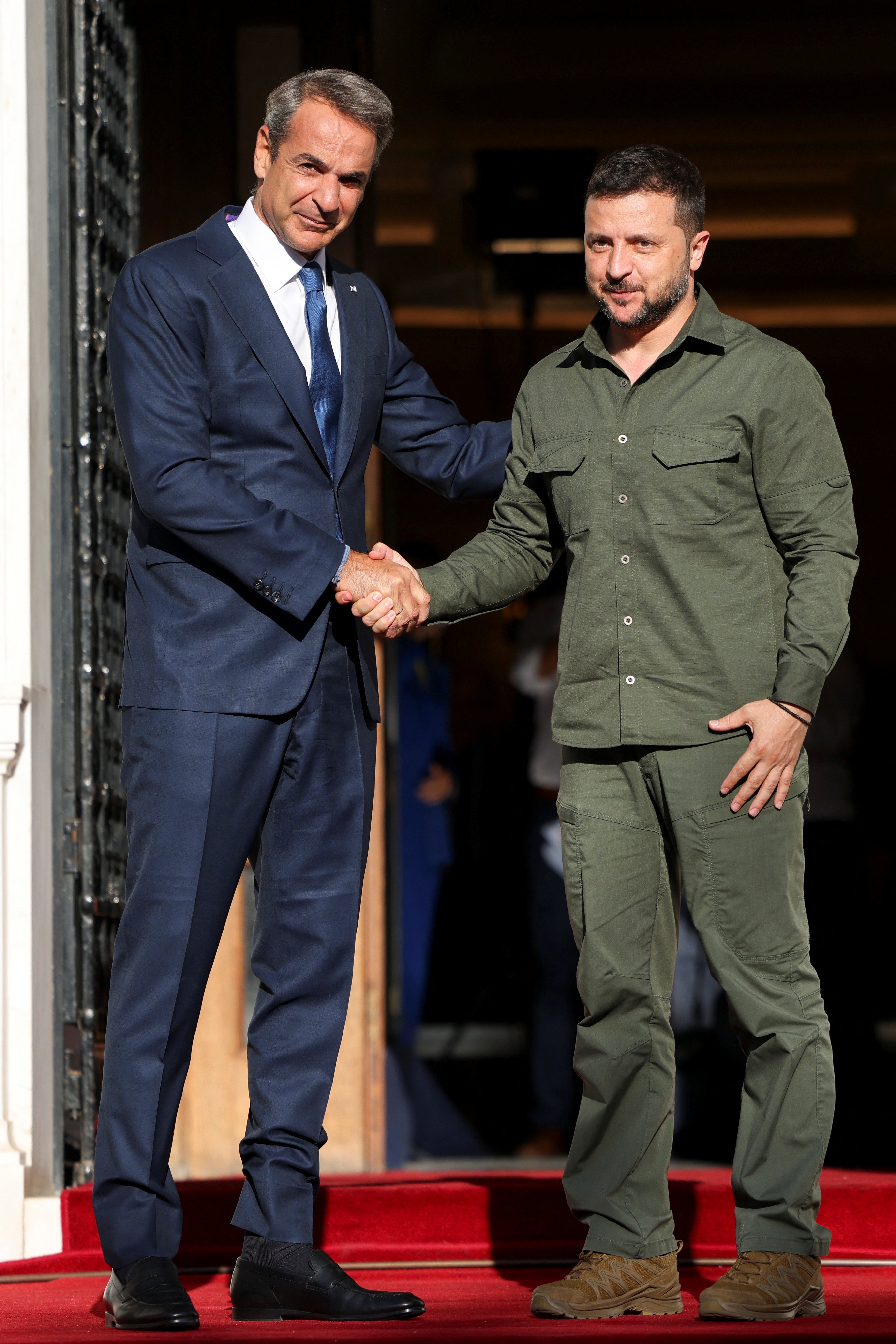
Harriette Boucher16 October 2025 02:00
Ukraine has prepared its ‘homework’ ahead of meeting with Trump, says Zelensky
Ukraine has prepared its “part of the homework” ahead of Zelensky’s meeting with Trump in Washington on Friday.
He says the agenda will be substantive, and the meeting could bring the war closer to an end.
We have already prepared our part of the homework ahead of the meeting with President Trump – both the military component and the economic one. Every detail is ready. The agenda of our meeting with the President of the United States is very substantive, and I thank everyone who… pic.twitter.com/Jwpp5bdn5h
— Volodymyr Zelenskyy / Володимир Зеленський (@ZelenskyyUa) October 15, 2025
Harriette Boucher16 October 2025 01:02
Kremlin denies Trump’s warning that Russian economy set to ‘collapse’
The Kremlin has hit back at accusations by Donald Trump that the Russian economy is on its way to “collapse”.
Asked about Trump’s remarks at an energy conference in Moscow, Deputy Prime Minister Alexander Novak, who oversees energy and the economy for the government, said that Russia had a stable supply of gasoline.
“We have a stable domestic market supply, we see no problems in this regard,” Novak said.
“The balance is maintained between production and consumption, and we, on the part of the government and the relevant ministries, are doing everything to ensure that this remains the case.”
You can read more below…
Nicole Wootton-Cane16 October 2025 00:00
Nato defence ministers agree ‘counter-drone measures’, Rutte says
A meeting of Nato country defence ministers have agreed additional counter-drone measures to step up support to Ukraine, chief Mark Rutte said.
In a post on X he wrote: “Excellent discussions with Defence Ministers, reaffirming increased defence investment, enhanced defence production & stepping up support to Ukraine.
“We will also implement additional counter-drone measures — #NATO is ready to do what it takes to keep our 1bn people safe & our territory secure.”
Nicole Wootton-Cane15 October 2025 23:00
Ukraine has relied on trains during the war – Russia is creating new technology to target them
As war rages on in Ukraine, the country has become reliant on its rail networks, which it has so far managed to keep running despite repeated strikes.
But officials and analysts are warning that advances in Russian drone capabilities and the growing tempo of attacks pose a serious threat to the vital infrastructure.
You can read more below…
Nicole Wootton-Cane15 October 2025 22:00
Trump has threatened to give Tomahawk missiles to Ukraine – but can they turn the tide of the war?
Washington may give access to powerful Tomahawk missiles, with Moscow threatening to respond. Experts tell Nicole Wootton-Cane that the weapons could significantly boost Ukraine – but their power shouldn’t be overstated.
Nicole Wootton-Cane15 October 2025 21:30
Watch: Zelensky confirms meeting with Trump in Washington
Nicole Wootton-Cane15 October 2025 21:00
Categories
Top Tags
Related posts






















